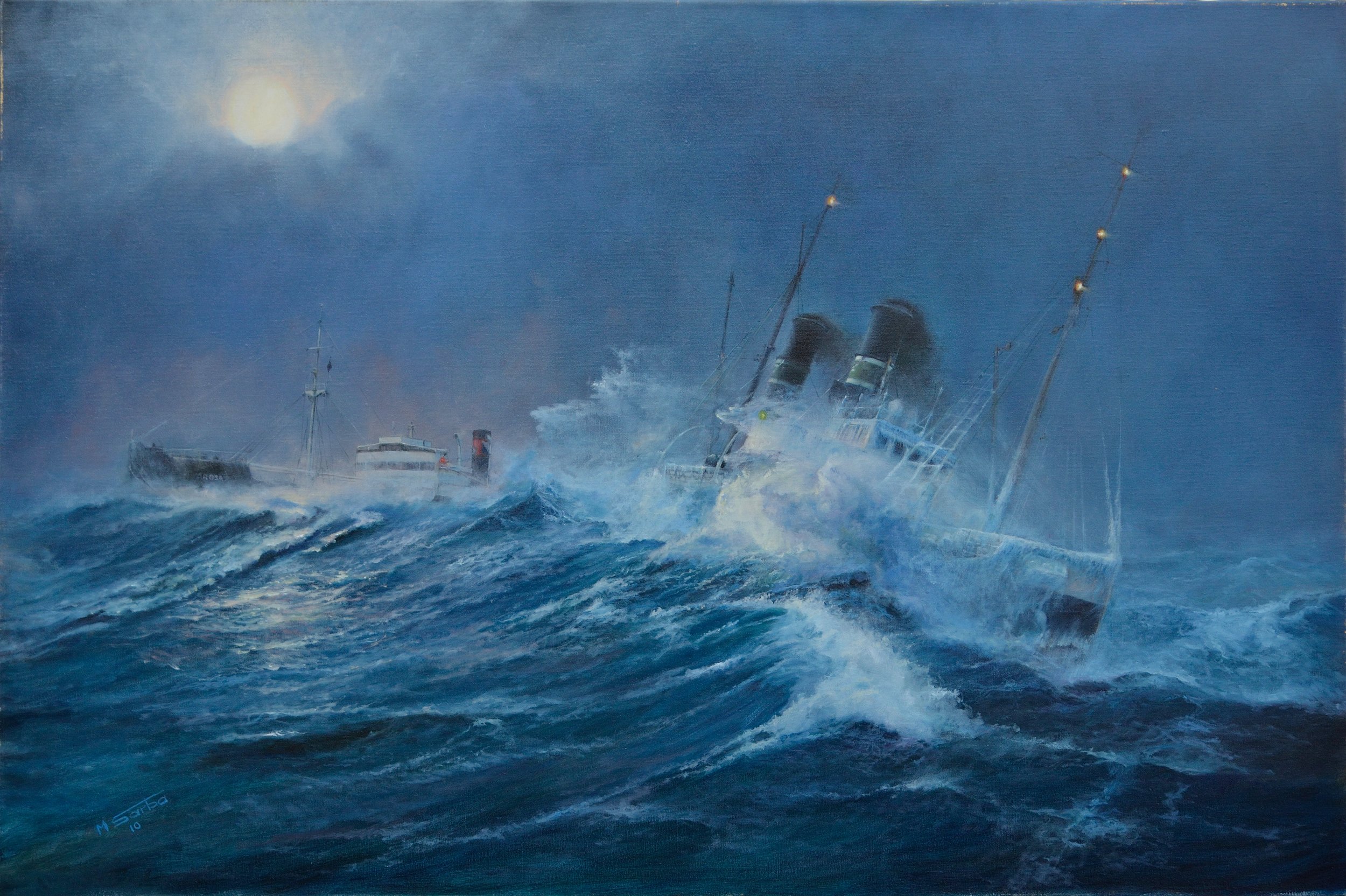For the Last Time:
The Rescue of the M.S. AROSA, New York, January 22, 1948
oil on canvas, 24” x 36”
$22,500
On January 22, 1948 Norwegian motor ship M.S.”Arosa” with a full cargo of mixed freight from Newport News Va. bound for Sweden stem thrust into the heaving swells of a hurricane. Her screw came up into the froth astern, then sank into solid depths and after all night of engine struggle at dawn “Arosa’s” screw turned slowly to a complete stop. The main reduction gears failed and the ship was dead. the ship’s SOS was received in New York early morning of January 23rd. In New York there was no salvage vessel able to proceed to the Arosa’s aid and further twenty hours had elapsed that the telephone in the offices of Foundation Maritime began to ring. One hour later tug S.S. “Foundation Franklin” was under way with help to the distant S.S.”Arosa” (580 miles away). Radio Direction Finder guided the tug and on the 27th January at 6:30 A.M. “Arosa” was no longer drifting and alone in mid-Atlantic. The connection had been made. The heavy ship in gigantic and jumbled sea created situation that convoy sped was desperately slow. At 9P .M. the vessels were beset by a full hurricane blowing ninety miles an hour. The temperature which had been steady at ten degrees dropped down to zero. The white heads of huge waves were striking “Franklin’s” upper works freezing and heavy coat where they struck. “Franklin” was still making a passage west at the rate of half a knot (0.6 MPH) and she held on it until midnight. And than towing line parted. All the rest of the night the two vessels drove back to the sea. Next day at 7 A.M. on January 28th in the false down the ships managed to reconnect. Continues heavy head seas, low temperature, radio out of action due to loss of aerial from icing… the convoy made only twenty miles in last twenty-four hours and reality on the end of this that the fuel will not last to Halifax (destination). The “Franklin’s” danger increased hourly as the bunkers became lighter and load of ice on the decks and the superstructure become heavier. There was more, the old “Franklin” was making water. In the morning of January 31 the wind rose to force 10 of the north-west making it impossible to make course for Halifax. M.S.”Arosa” now refused to tow. She fell of until she was laying right out abeam of “Franklin”. The consequent strain on the towing gear become intolerable and in desperation “Franklin’s” captain attempted to bring tug head up into the new gale so that he could at least hold “Arosa” steady.For the first time “Franklin” reacted way to slow in answer to her helm.The sea struck full on her starboard bow .The towing line rose almost clear of the seas and towing winch itself tore loose from its bed on “Franklin’s” after deck, ripped deck plates curled like a paper. The winch’s drum tore from its socket and screamed into the depths astern. “Franklin” was completely out of control now. The sea poured in through gaping where the winch had stood and all electric power failed.Water rose above the bed plates. The tug vanished in a towering column of grey spume from eyes of officers on “Arosa’s” bridge. SOS signal was send and received in Halifax, than call after call began going out under “Franklin’s” code sign.There was no replay. Next tugboat M.S. “Josephine Foundation” was send to the “Arosa” and “Franklin” position. Captain of “Josephine” doubled the lookouts going along the track that “Franklin” might be fallowing if she was still afloat. There was no positive results and in his opinion the “Franklin’ had gone down. The “Arosa” was taken over by “”Josephine” battling the storm to bring the convoy into Boston harbor on the end. On the February 5 in first the bleak light about dozen people at the Foundation dock watched with unbelieving eye. The S.S. “Foundation Franklin” was approaching harbor under quarter power, listing twelve degrees to port and she was far down by the bow. The Franklin had come home with complete crew from her last voyage.
